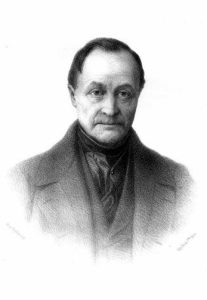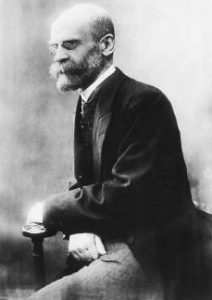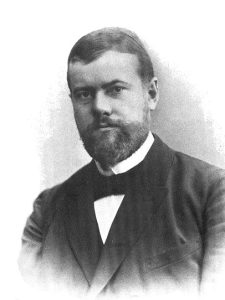The History of Sociology
- When did sociology emerge as a discipline and what were the social forces that made this happen?
- Where did sociology first develop, and how have other areas of the world contributed to sociology since then?
Since ancient times, people have been fascinated by the relationship between individuals and the societies to which they belong. Many topics studied in modern sociology were also initially studied by ancient philosophers in their desire to describe an ideal society, including theories of social conflict, economics, social cohesion, and power (Hannoum 2003).
In the thirteenth century, Ma Tuan-Lin, a Chinese historian, first recognized social dynamics as an underlying component of historical development in his seminal encyclopedia, General Study of Literary Remains. The next century saw the emergence of the historian some consider to be the world’s first sociologist: Ibn Khaldun (1332–1406) of Tunisia. He wrote about many topics of interest today, setting a foundation for both modern sociology and economics, including a theory of social conflict, a comparison of nomadic and sedentary life, a description of political economy, and a study connecting a tribe’s social cohesion to its capacity for power (Hannoum 2003).
In the eighteenth century, Age of Enlightenment philosophers developed general principles that could be used to explain social life. Thinkers such as John Locke, Voltaire, Immanuel Kant, and Thomas Hobbes responded to what they saw as social ills by writing on topics that they hoped would lead to social reform. Mary Wollstonecraft (1759–1797) wrote about women’s conditions in society. Her works were long ignored by the male academic structure, but since the 1970s, Wollstonecraft has been widely considered the first feminist thinker of consequence.
All of this helped lay the foundation for the establishment of sociology as a discipline. The actually founding of sociology as a discipline does not occur until the nineteenth century, in Western Europe. The early nineteenth century saw great changes with the Industrial Revolution, increased mobility, and new kinds of employment. It was also a time of great social and political upheaval with the rise of empires that exposed many people—for the first time—to societies and cultures other than their own. Millions of people moved into cities and many people turned away from their traditional religious beliefs. As these changes were happening people were starting to develop new questions about old institutions such a family, work, religion, politics, and the economy.
In the eighteenth century, Europe experienced a dramatic rise in technological invention, ushering in an era known as the Industrial Revolution. What made this period remarkable was the number of new inventions that influenced people’s daily lives. Within a generation, tasks that had until this point required months of labor became achievable in a matter of days. Before the Industrial Revolution, work was largely person- or animal-based, and relied on human workers or horses to power mills and drive pumps. In 1782, James Watt and Matthew Boulton created a steam engine that could do the work of twelve horses by itself.
Steam power began appearing everywhere. Instead of paying artisans to painstakingly spin wool and weave it into cloth, people turned to textile mills that produced fabric quickly at a better price and often with better quality. Rather than planting and harvesting fields by hand, farmers were able to purchase mechanical seeders and threshing machines that caused agricultural productivity to soar. Products such as paper and glass became available to the average person, and the quality and accessibility of education and health care soared. Gas lights allowed increased visibility in the dark, and towns and cities developed a nightlife.
One of the results of increased productivity and technology was the rise of urban centers. Workers flocked to factories for jobs, and the populations of cities became increasingly diverse. The new generation became less preoccupied with maintaining family land and traditions and more focused on acquiring wealth and achieving upward mobility for themselves and their families. People wanted their children and their children’s children to continue to rise to the top, and as capitalism increased, so did social mobility.
It was during the eighteenth and nineteenth centuries of the Industrial Revolution that sociology was born. Life was changing quickly and the long-established traditions of the agricultural eras did not apply to life in the larger cities. Masses of people were moving to new environments and often found themselves faced with horrendous conditions of filth, overcrowding, and poverty. Social scientists emerged to study the relationship between the individual members of society and society as a whole.
At this point in history, the natural sciences (physics, biology, chemistry, etc) were established and were valued for their empiricism. The natural sciences of course provide facts backed by empirical evidence. As the nineteenth century progressed, a need for a framework to understand the social world during this period of radical change, in addition to the natural world developed. Psychology was the first social science to be established as a discipline. The focus was on the individual in terms of their mentality, perception, and psyche.
Creating a Discipline

The term sociology was first coined in 1780 by the French essayist Emmanuel-Joseph Sieyès (1748–1836) in an unpublished manuscript (Fauré et al. 1999). In 1838, the term was reinvented by Auguste Comte (1798–1857). Comte originally studied to be an engineer, but later became a pupil of social philosopher Claude Henri de Rouvroy Comte de Saint-Simon (1760–1825). They both thought that social scientists could study society using the same scientific methods utilized in natural sciences. Comte also believed in the potential of social scientists to work toward the betterment of society. (Abercrombie et al. 2000).
Harriet Martineau (1802-1876) was a french writer who addressed a wide range of social science issues. She was an early observer of social practices, including economics, social class, religion, suicide, government, and women’s rights. Her writing career began in 1832 with a series of stories titled Illustrations of Political Economy, in which she tried to educate ordinary people about the principles of economics (Johnson 2003).Martineau was the first to translate Comte’s writing from French to English and thereby introduced sociology to English-speaking scholars (Hill 1991).
Although Sieye’s, Comte, Martineau helped develop the foundation for sociology, the three primary founders of sociology, understood as the classical sociologists, were: Karl Marx, Max Weber, and Emile Durkheim. This triad is also often referred to as the early canon of sociology.
Karl Marx (1818–1883)

Karl Marx (1818–1883) was a German philosopher and economist. In 1848 he and Friedrich Engels (1820–1895) coauthored the Communist Manifesto. This book is one of the most influential political manuscripts in history. It also presents Marx’s theory of society, which differed from what Comte proposed.
Marx rejected Comte’s positivism. He believed that societies grew and changed as a result of the struggles of different social classes over the means of production. At the time he was developing his theories, the Industrial Revolution and the rise of capitalism led to great disparities in wealth between the owners of the factories and workers. Marx viewed capitalism as a structure that created conflict for society. Capitalism, an economic system characterized by private or corporate ownership of goods and the means to produce them, grew in many nations.
Marx predicted that inequalities of capitalism would become so extreme that workers would eventually revolt. This would lead to the collapse of capitalism, which would be replaced by communism. Communism is an economic system under which there is no private or corporate ownership: everything is owned communally and distributed as needed. Marx believed that communism was a more equitable system than capitalism.
While his economic predictions may not have come true in the time frame he predicted, Marx’s idea that social conflict leads to change in society is still one of the major theories used in modern sociology.
Émile Durkheim (1858–1917)

Durkheim helped establish sociology as a formal academic discipline by establishing the first European department of sociology at the University of Bordeaux in 1895 and by publishing his Rules of the Sociological Method in 1895. In another important work, Division of Labour in Society (1893), Durkheim laid out his theory on how societies transformed from a primitive state into a capitalist, industrial society. According to Durkheim, people rise to their proper levels in society based on merit.
Durkheim believed that sociologists could study objective “social facts” (Poggi 2000). The term mentioned earlier in the chapter, social facts, was developed by Emile Durkheim. He was interested in the role and function of groups for establishing culture in society at large. He also believed that through such studies it would be possible to determine if a society was “healthy” or “pathological.” He saw healthy societies as stable, while pathological societies experienced a breakdown in social norms between individuals and society.
In 1897, Durkheim attempted to demonstrate the effectiveness of his rules of social research when he published a work titled Suicide. Durkheim examined suicide statistics in different police districts to research differences between Catholic and Protestant communities. He attributed the differences to socio-religious forces rather than to individual or psychological causes.
Max Weber (1864–1920)

Prominent sociologist Max Weber established a sociology department in Germany at the Ludwig Maximilians University of Munich in 1919. Weber wrote on many topics related to sociology including political change in Russia and social forces that affect factory workers. He is known best for his 1904 book, The Protestant Ethic and the Spirit of Capitalism. The theory that Weber sets forth in this book is still controversial. Some believe that Weber argued that the beliefs of many Protestants, especially Calvinists, led to the creation of capitalism. Others interpret it as simply claiming that the ideologies of capitalism and Protestantism are complementary. Weber argued that the function of religion and the economy were more similar than not.
Weber believed that it was difficult, if not impossible, to use standard scientific methods to accurately predict the behavior of groups as people hoped to do. They argued that the influence of culture on human behavior had to be taken into account. This even applied to the researchers themselves, who, they believed, should be aware of how their own cultural biases could influence their research. To deal with this problem, Weber and Dilthey introduced the concept of verstehen, a German word that means to understand in a deep way. In seeking verstehen, outside observers of a social world—an entire culture or a small setting—attempt to understand it from an insider’s point of view.
In his book The Nature of Social Action (1922), Weber described sociology as striving to “interpret the meaning of social action and thereby give a causal explanation of the way in which action proceeds and the effects it produces.” He and other like-minded sociologists proposed a philosophy of antipositivism whereby social researchers would strive for subjectivity as they worked to represent social processes, cultural norms, and societal values. This approach led to some research methods whose aim was not to generalize or predict (traditional in science), but to systematically gain an in-depth understanding of social worlds.
The different approaches to research based on positivism or antipositivism are often considered the foundation for the differences found today between quantitative sociology and qualitative sociology.
- Quantitative sociology uses statistical methods such as surveys with large numbers of participants. Researchers analyze data using statistical techniques to see if they can uncover patterns of human behavior.
- Qualitative sociology seeks to understand human behavior by learning about it through in-depth interviews, focus groups, and analysis of content sources (like books, magazines, journals, and popular media).
Although the three classical sociologists helped develop the discipline of sociology in the nineteenth century in the countries of France and Germany, in Western Europe. they were not alone. An example of another important sociological thinker at the time was Georg Simmel (1858–1918), a German art critic who wrote widely on social and political issues as well.
Summary
Sociology was developed as a way to study and try to understand the changes to society brought on by the Industrial Revolution in the eighteenth and nineteenth centuries. Some of the earliest thinkers in the field thought that societies and individuals’ roles in society could be studied using the same scientific methodologies that were used in the natural sciences, while others believed that is was impossible to predict human behavior scientifically, and still others debated the value of such predictions. Those perspectives continue to be represented within sociology today.
Short Answer Questions
What do you make of Karl Marx’s contributions to sociology? What perceptions of Marx have you been exposed to in your society, and how do those perceptions influence your views?
Weber’s claim that the institutions of religion and economy are more similar than not in terms of their purpose and function was viewed as a radical way of thinking. Is this still the case?
Durkheim argued that social facts help shape behavior, why do you think many individuals would disagree when thinking about their own actions?
Do you tend to place more value on qualitative or quantitative research? Why? Does it matter what topic you are studying?
References
Abercrombie, Nicholas, Stephen Hill, and Bryan S. Turner. 2000. The Penguin Dictionary of Sociology. London: Penguin.
Durkheim, Émile. 1964 [1895]. The Rules of Sociological Method, edited by J. Mueller, E. George and E. Caitlin. 8th ed. Translated by S. Solovay. New York: Free Press.
Fauré, Christine, Jacques Guilhaumou, Jacques Vallier, and Françoise Weil. 2007 [1999]. Des Manuscrits de Sieyès, 1773–1799, Volumes I and II. Paris: Champion.
Hannoum, Abdelmajid. 2003. Translation and the Colonial Imaginary: Ibn Khaldun Orientalist. Middletown, CT: Wesleyan University. Retrieved January 19, 2012 (http://www.jstor.org/pss/3590803).
Hill, Michael. 1991. “Harriet Martineau.” Women in Sociology: A Bio-Bibliographic Sourcebook, edited by Mary Jo Deegan. New York: Greenwood Press.
Johnson, Bethany. 2003. “Harriet Martineau: Theories and Contributions to Sociology.” Education Portal. Retrieved October 14, 2014 (http://education-portal.com/academy/lesson/harriet-martineau-theories-and-contributions-to-sociology.html#lesson).
Poggi, Gianfranco. 2000. Durkheim. Oxford, United Kingdom: Oxford University Press.
Ritzer, George, and Goodman, Douglas. 2004. Sociological Theory, 6th Edition. New York: McGraw Hill Education.
Stapley, Pierre. 2010. “Georg Simmel.” Cardiff University School of Social Sciences. Retrieved October 21, 2014 (http://www.cf.ac.uk/socsi/undergraduate/introsoc/simmel.html).
U.S. Congress Joint Economic Committee. 2010. Women and the Economy, 2010: 25 Years of Progress But Challenges Remain. August. Washington, DC: Congressional Printing Office. Retrieved January 19, 2012 (http://jec.senate.gov/public/?a=Files.Serve&File_id=8be22cb0-8ed0-4a1a-841b-aa91dc55fa81).
GLOSSARY
- antipositivism
- the view that social researchers should strive for subjectivity as they worked to represent social processes, cultural norms, and societal values
- generalized others
- the organized and generalized attitude of a social group
- positivism
- the scientific study of social patterns
- qualitative sociology
- in-depth interviews, focus groups, and/or analysis of content sources as the source of its data
- quantitative sociology
- statistical methods such as surveys with large numbers of participants
- significant others
- specific individuals that impact a person’s life
- verstehen
- a German word that means to understand in a deep way
